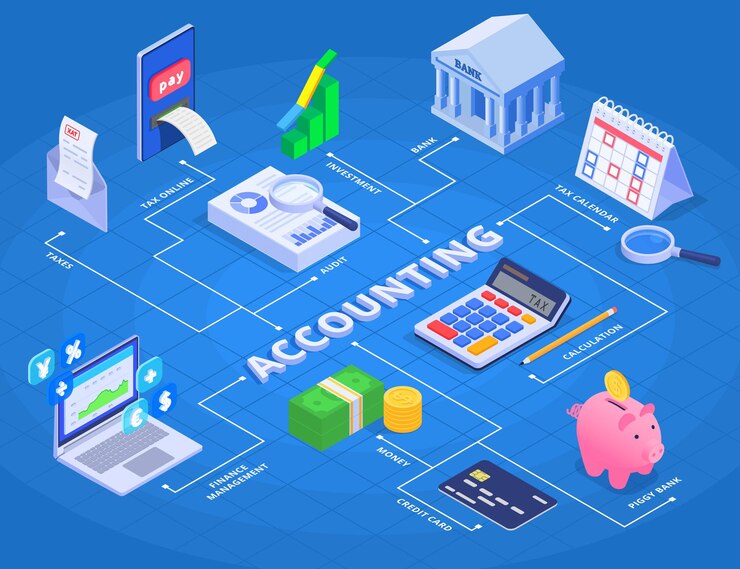A robust and efficient accounting system is the backbone of effective financial management. It is crucial to an organization because it makes running the business much easier. The accounting system provides vital financial information essential for informed decision-making, regulatory compliance, and investor confidence; thus, constructing one that meets these demands requires careful planning, implementation, and ongoing maintenance.
To build an accounting system that will be efficient and applicable to the realities of the modern business world, you need a well-defined process, a knowledgeable finance team, and the appropriate financial information systems.
In this article, we will show you the key components and fundamentals necessary for building an effective accounting system.
Components of an Accounting System
Here are the top three components needed to construct an effective accounting system: None of these components are dispensable.
1. Financial Processes
These refer to the procedures or tasks involved in ensuring accurate and transparent financial management and reports. It includes significant activities such as transaction recording, financial reporting, budgeting and forecasting, and internal controls.
a. Transaction Recording
This entails capturing all financial transactions accurately and promptly. Doing this ensures proper documentation of financial activities, which serves as the basis for financial analysis and reporting. Key activities involved in transaction recording include:
- Recording sales and revenue.
- Documenting expenses and purchases.
- Maintaining accounts receivable and payable.
- Keeping detailed records of asset acquisitions and disposals.
b. Financial Reporting
This refers to generating timely and accurate financial reports. This provides stakeholders with insights into the financial health of the organization. It includes generating:
- Income Statement (Profit and Loss Statement)
- Balance Sheet
- Cash Flow Statement
- Statement of Changes in Equity
c. Budgeting and Forecasting
This deals with planning future financial performance, which guides the business owners and management in goal setting, resource allocation, and building systems to meet the future needs of the business. It involves constructing annual budgets and forecasts.
d. Internal Controls
This refers to implementing measures to ensure accuracy and transparency to prevent fraud and omissions. This is vital to maintaining the integrity of financial records. It involves the segregation of duties to prevent fraud, regular reconciliations of accounts, and internal audits to assess the compliance of the financial records with appropriate policies and controls.
2. Finance Team
In addition to having an effective financial process, you need a trained and informed finance team to interpret the financial records and provide accurate insights. The roles and responsibilities of the team members should be clearly defined to ensure operational efficiency and accountability. This helps to develop a structure that prevents gaps in responsibilities and overlaps that can disrupt the cohesive workflow.
To effectively build your business accounting system, your finance team must possess relevant skills and expertise in taxation, financial planning, analysis, and management.
3. Financial Information Systems
Financial information systems refer to the workflows, software and database involved in processing and storing financial information. Leveraging robust accounting software or ERP systems helps the finance team to capture, manage, and streamline your financial data. There are a lot of modern ERP systems that you can check out, such as SAP S/4HANA, Oracle ERP Cloud, Microsoft Dynamics 365, Infor CloudSuite, NetSuite ERP, Epicor ERP, Sage X3, Odoo, Workday, or IFS Applications.
A reliable financial information system helps to capture and store data systematically while facilitating accurate and efficient processing and record-keeping of the stored data. With accounting software or ERP system, routine tasks can be automated, making them more efficient and quicker while at the same time reducing the likelihood of errors, which are essential for comprehensive financial reporting and analysis. Ultimately, this enables the team to make better financial decisions, which is critical for organizational efficiency.
Fundamentals for Building an Effective Accounting System
Here are some basic and non-negotiable factors to build an effective accounting system. The absence of any can affect the effectiveness of your accounting system.
- Detailed and Clearly Defined Processes & Policies with Internal Controls
You must have well-defined and transparent procedures for managing day-to-day financial activities to ensure that financial operations are conducted efficiently. Establishing a defined process includes creating standardized procedures and communication lines for cash handling, transaction recording, and expense management to ensure consistency and accuracy across the organization.
Internal controls must be in place to detect errors, prevent fraud, and ensure your financial records comply with internal policies and statutory regulations. When the processes are well defined and explained to the finance team, there is a more accurate and timely preparation of financial statements. This gives stakeholders access to reliable financial information to make necessary, informed decisions.
- Clearly Defined Organizational Structure and Job Descriptions for the Finance Team
There will be overlaps and neglect of duties in the finance team if the organization structure and job decription are not well defined and explained to each team member. A clear organizational structure is fundamental for efficient operations and accountability.
There should be a well-defined hierarchy and clear reporting lines to enlighten each team member of their role and responsibilities. This promotes coordination and minimizes overlaps in duties. Additionally, define their job roles, outlining specific responsibilities and expectations for each role. By doing so, you can hold each team member accountable and keep a check on their performance.
- Competent Finance Team
You need a finance team with relevant skills and experience for effective financial management. Do not employ just anybody; ensure they possess the right skills appropriate to your industry.
As much as they are well experienced, there should be continuous training and skill development to keep them updated. Financial technologies are evolving at a fast pace. They cannot leverage new tools and methodologies to enhance their performance without being continuously updated.
- A Well-defined chart of Accounts
The finance team should develop a well-defined chart of accounts that aligns with the company’s operational structure, reflecting the various facets of business operations. This ensures that the financial data is categorized appropriately, making it easy to conduct data analysis and interpretation. The chart of accounts must also meet the information needs and reporting requirements of internal stakeholders and external regulatory bodies.
- Systematic Record-Keeping
Implement a systematic approach to documenting and recording financial transactions and records to ensure the comprehensive accuracy of the system. Organize the records in a manner that allows for easy retrieval and reference. Financial processes should not be done haphazardly; there should be a well-defined systematic procedure for doing things,
This system helps maintain the accuracy and completeness of financial data, which is essential for implementing internal controls and conducting auditing, compliance, and financial reporting duties.
- Industry-Appropriate Accounting Software/ERP
Selecting accounting software or ERP systems that meet the specific needs of the industry and business is vital for building an effective accounting system. Choose software capable of integrating with other systems used by the organization. Also, it must be scalable to accommodate business growth. Getting appropriate accounting software keeps your financial information system robust and adaptable to support the evolving needs of the organization while maintaining accuracy and efficiency.
Final Words
Mac Adebowale Professional Services is here to guide you in creating a top-notch accounting system tailored to your business needs. We’ll help you set up efficient processes, use the best financial tools, and train your finance team for success. Whether you want to upgrade your system or boost your team’s skills, we’re here to ensure you achieve accuracy and efficiency. Contact us today at emails@macadebowale.com or macadebowaleadvisory@gmail.com, and let’s get started!





